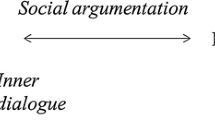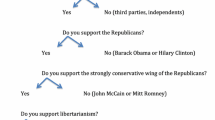Abstract
In this article a dialectical model for practical reasoning within a community, based on the Generic/Actual Argument Model (GAAM) is advanced and its application to deliberative dialogue discussed. The GAAM, offers a dynamic template for structuring knowledge within a domain of discourse that is connected to and regulated by a community. The paper demonstrates how the community accepted generic argument structure acts to normatively influence both admissible reasoning and the progression of dialectical reasoning between participants. It is further demonstrated that these types of deliberation dialogues supported by the GAAM comply with criteria for normative principles for deliberation, specifically, Alexy’s rules for discourse ethics and Hitchcock’s Principles of Rational Mutual Inquiry. The connection of reasoning to the community in a documented and transparent structure assists in providing best justified reasons, principles of deliberation and ethical discourse which are important advantages for reasoning communities.

Similar content being viewed by others
References
Afshar F, Yearwood J, Stranieri A (2006) A tool for assisting group decision making for consensus outcomes in organization. In: Voges K, Pope N (eds) Business applications and computational intelligence. IDEA Group Publishing, Hershey
Alexy R (1978) A theory of practical discourse. In: Benhabib S, Dallmayr F (eds) The communicative ethics controversy, studies in contemporary German social thought. MIT Press, Cambridge, MA, USA pp 151–190. 1990 Translation by Frisby D of: Eine Theorie des praktischen Diskurses. In: Oelmuller W (ed), Normenbegrundung-Normendurchsetzung. Paderborn, Germany
Amgoud L, Maudet N, Parsons S (2000a) Modelling dialogues using argumentation. In: Durfee (ed) Proceedings of the fourth international conference on multi-agent systems (ICMAS-2000). IEEE Press, New York, pp 31–38
Amgoud L, Maudet N, Parsons S (2000b) Arguments, dialogue and negotiation. In: Horn (ed) Proceedings of the fourteenth european conference on artificial intelligence (ECAI-2000). IOS Press, Amsterdam, pp 338–342
Avery J, Yearwood J, Stranieri A (2001) An argumentation-based multi-agent system for eTourism Dialogue. HIS 2001. International Workshop on Hybrid Intelligent Systems, pp 497–512
Baker MJ (1998) The function of argumentation dialogue in cooperative problem-solving. In: van Eemeren FH, Grootendorst R, Blair JA, Willard CA (eds) Proceedings of the 4th international conference on argumentation (ISSA98). SIC SAT Publications, Amsterdam, pp 27–33
Carbogim D, Robertson D, Lee J (2000) Argument-based applications to knowledge engineering. Knowl Eng Rev 15(2):119–149
Cohen P (1985) Heuristic reasoning about uncertainty: an artificial intelligence approach. Pitman, London
Dung PM (1995) On the acceptability of arguments and its fundamental role in non-monotonic reasoning, logic programming and n-person games. Artif Intell 77(2):321–357
Emery M, Purser R (1995) The search conference: a powerful method for planning organizational change and community action. Jesse-Bass Public Administration Series, San Francisco
Farley AM, Freeman K (1995) Burden of proof in legal argumentation. In Proceedings of the fifth international conference on artificial intelligence and law. ACM Press, New York, May 21–24, pp 156–164
Fox J (1986) Knowledge, decision making and uncertainty. In: Gale WA (ed) Artificial intelligence and statistics. Addison-Wesley, Reading, Massachusetts
Fox J, Parsons S (1998) Arguing about beliefs and actions. In: Hunter A, Parsons S (eds) Applications of uncertainty formalisms. Springer, Berlin Heidelberg New York, pp 266–302
Girle R, Hitchcock DL, McBurney P, Verheij B (2003) Decision support for practical reasoning: a theoretical and computational perspective. Argumentation Machines. New frontiers in argument and computation. In: Reed C, Norman TJ (eds) Kluwer Academic Publishers, Dordrecht, pp 55–84
Gordon TF (1995) The pleadings game: An exercise in computational dialectics. Artif Intell Law 2(4):239–292
Gordon TF, Karacapilidis NI (1997) The Zeno argumentation framework. In: Proceedings of the sixth international conference on artificial intelligence and law. ACM Press, New York, pp 10–18
Govier T (1987) Problems in argument analysis and evaluation. Foris, Dordrecht
Govier T (1992) A practical study of argument. 3rd edn. Wadsworth, Belmont, California, USA
Hitchcock D (1991) Some principles of rational mutual inquiry. In: van Eemeren F, Grootendorst R, Blair JA, Willard CA (eds) Proceedings of the second international conference on argumentation (AAAI 2000). SICSAT: International Society for the Study of Argumentation, pp 236–243
Hitchcock D, McBurney P, Parsons S (2001) A framework for deliberation dialogues, argumentation and its applications. In: Proceedings of the fourth biennial conference of the ontario society for the study of argumentation
Hulstijn J (2000) Dialogue models for inquiry and transaction. PhD thesis, Enschede, The Netherlands
Lave J, Wenger E (1991) Situated learning: legitimate peripheral participation. Cambridge University Press, Cambridge
McBurney P, Parsons S (2001) Representing epistemic uncertainty by means of dialectical argumentation. Ann Math Artif Intell 32(1–4):125–169
McBurney P, Parsons S, Wooldridge M (2002) Desiderata for agent argumentation protocols. In: Proceedings of the international conference on autonomous agents and multi-agent systems (AAMAS-02). ACM Press, New York
McBurney P, van Eijk RM, Parsons S, Amgoud L (2003) A dialogue game protocol for agent purchase negotiations. J Autonom Agents Multi-Agent Syst 7(3):235–273
Pollock JL (1987) Defeasible reasoning. Cognitive Sci 11:481–518
Poole DL (1988) A logical framework for default reasoning. Artif Intell 36:27–47
Prakken H (1993) A logical framework for modelling legal argument. In: Proceedings of the fourth international conference on artificial intelligence and law. ACM Press, New York pp 1–9
Prakken H, Sartor G (1996) A dialectical model of assessing conflicting arguments in legal reasoning. Artif Intell Law 4:331–368
Rittel HWJ, Webber MW (1973) Dilemmas in a general theory of planning. Policy Sci 4:155–169
Sadri F, Toni F, Torroni P (2001) Logic agents, dialogues and negotiation: an abductive approach. In: Schroeder M, Stathis K (eds) Proceedings of the symposium on information agents for e-commerce, artificial intelligence and the simulation of behaviour conference. AISB
Singh MP (2000) A social semantics for agent communications languages. In: Dignum F, Chaib-draa B, Weigand H (eds) Proceedings of the international joint conference on artificial intelligence (IJCAI-99) workshop on agent communication languages. Springer, Berlin Heidelberg New York
Stranieri A, Zeleznikow J, Gawler M, Lewis B (1999) A hybrid rule-neural approach for the automation of legal reasoning in the discretionary domain of family law in Australia. Artif Intell Law 7(2–3):153–183
Stranieri A, Zeleznikow J, Yearwood J (2001a) Argumentation structures that integrate dialectical and non-dialectical reasoning. Knowl Eng Rev 16(4):331–358
Stranieri A, Yearwood J, Zeleznikow J (2001b) Tools for world wide web based legal decision support systems. In: Proceedings of the eighth international conference on artificial intelligence and law, ICAIL’01. ACM Press, New York, pp 206–214
Stranieri A, Yearwood J, Gervasoni S, Garner S, Deans C, Johnstone A (2004) Web-based decision support for structured reasoning in health. Twelfth national health informatics conference. Health Informatics Society of Australia. p 61
Toulmin S (1958) The uses of argument. Cambridge University Press, Cambridge
Verheij B (1996) Rules, reasons, arguments. formal studies of argumentation and defeat. PhD thesis
Verheij B (1999) Automated argument assistance for lawyers. In Proceedings of the seventh international conference on artificial intelligence and law, pp 43–52
Vreeswijk GAW (1993) Defeasible dialectics: a controversy-oriented approach towards defeasible argumentation. J Logic Comput 3(3):3–27
Vreeswijk GAW (1997) Abstract argumentation systems. Artif Intell 90:225–279
Walton DN, Krabbe ECW (1995) Commitment in dialogue: basic concepts of interpersonal reasoning. State University of New York Press, Albany
Wilhelm AG (2000) Democracy in the digital age. Challenges to political life in the digital age Routledge. USA
Wohlrapp H (1998) A new light on non-deductive argumentation schemes. Argumentation 12:341–350
Yearwood J, Stranieri A (1999) The integration of retrieval, reasoning and drafting for refugee law: a third generation legal knowledge based system Seventh International Conference on Artificial Intelligence and Law. ICAIL’99 ACM Press, New York, pp 117–137
Yearwood J, Stranieri A (2000a) Knowledge as arguments for facilitating e-commerce dialogue. In: Proceedings of the sixth CollECTeR conference on electronic commerce, CollECTeR’2000
Yearwood J, Stranieri A (2000b) An argumentation shell for knowledge based systems. In: Proceedings of IASTED international conference on law and technology, pp 105–111
Yearwood J, Stranieri A (2002) Generic arguments: a framework for supporting online deliberative discourse. In: Enabling organisations and society through information systems, proceedings of the thirteenth australasian conference on information systems (ACIS’2002), pp 337–346
Yearwood J, Stranieri A (2006) The generic/actual argument model for practical reasoning. Dec Support Syst 41(2):358–379
Acknowledgments
The authors are grateful to Dr. David Hitchcock from the Philosophy Department at McMaster University for carefully reviewing this work and providing suggestions that have greatly helped to improve the paper. This research was supported by the Australian Research Council.
Author information
Authors and Affiliations
Corresponding author
Rights and permissions
About this article
Cite this article
Yearwood, J.L., Stranieri, A. Deliberative discourse and reasoning from generic argument structures. AI & Soc 23, 353–377 (2009). https://doi.org/10.1007/s00146-006-0069-y
Received:
Accepted:
Published:
Issue Date:
DOI: https://doi.org/10.1007/s00146-006-0069-y




